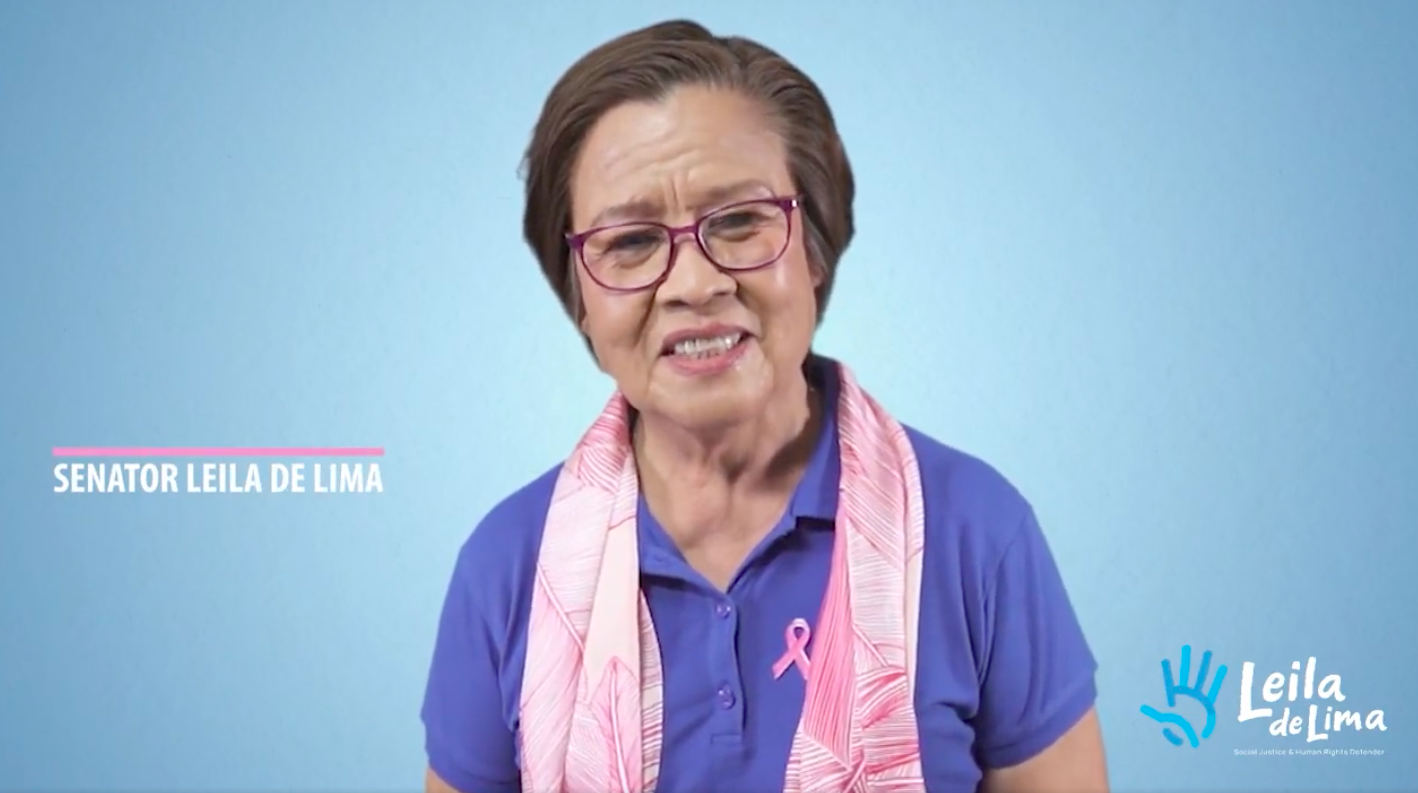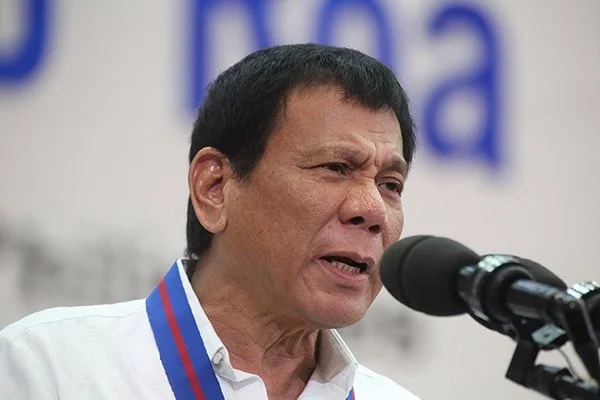Senator Leila de Lima, Unyielding and Undefeated
/Senator Leila de Lima today in a Twitter campaign video (Screenshot from Twitter)
Leila de Lima and Rodrigo Duterte had met some years before when she was chair of the Commission on Human Rights investigating extrajudicial murders reportedly committed by the Davao Death Squad. Mayor Duterte never forgave her for her incursion into his territory, and when he became president and she, a crusading senator, he vowed to “cancel” her from the Senate and from Philippine society. With the Department of Justice, the Philippine National Police, a number of convicted drug lords, compliant members of the House of Representatives and the Senate, Duterte flung a case of drug trafficking against Senator de Lima, built on a mountain of lies. On February 24, 2017, on orders of the court, she was arrested in her office at the Senate on drug charges.
De Lima arrested at her office on February 24, 2017 (Source: CNN.com)
To their eternal disgrace, not one of her colleagues in the Senate, outside of her party-mates, came to de Lima’s defense.
Leila de Lima has been detained in virtual isolation – with no access to TV, radio, internet, cell phone, and allowed only occasional visitors--in Camp Crame for most of her six-year term. She has spent the last five years issuing daily handwritten missives on national events and issues and doing her work as a senator -- drafting bills and resolutions. In the present 18th Congress, as of February 22, 2022, she has principally authored 101 bills and co-authored 62; proffered 132 resolutions and co-authored 85. Six of her laws (as co-author) have passed and 71 resolutions have been adopted. Ironically, her landmark social justice legislation have been claimed as accomplishments by the Duterte government:
Republic Act No. 11310 has institutionalized the Pantawid Pamilyang Pilipino Program (4Ps), a human development measure of the national government that provides conditional cash grants to the poorest of the poor, to improve the health, nutrition, and the education of children aged 0-18. It is patterned after the conditional cash transfer (CCT) schemes in Latin American and African countries, which have lifted millions of people around the world from poverty.
Republic Act No. 11291 or the Magna Carta for the Poor champions the cause of the underprivileged by ensuring their full access to basic services to help alleviate poverty and mandates the government to establish a system of progressive realization or implementation to provide the requirements, conditions, and opportunities for the full enjoyment of the fundamental rights by the poor.
R.A. No. 11135, or the Community-Based Monitoring System Act (CMBS), mandates the establishment of a monitoring system down to the barangay level, which shall institutionalize a nationwide databank that can be used by national government agencies and local government units in the formulation and implementation of poverty-alleviation and development programs.
De Lima, who was the principal sponsor and co-author of the Senior Citizen Bill in the Senate, also worked for the signing into law of R.A. No. 11350 creating the National Commission of Senior Citizens (NCSC), which is dedicated solely to handling the concerns of the elderly. Under the law, the NCSC will not only ensure strict implementation of laws for the elderly, but will also task the Department of Social Welfare and Development to create policies and oversight programs for them.
De Lima during a privilege speech in the Sanate, January 2017 (Source: Rappler)
Some of her other priority legislations include the Human Rights Defenders Bill, Anti-Extrajudicial Killing Bill, Refugees and Stateless Persons Protection Bill, Comprehensive Prison Reform Bill, Criminal Investigation Bill, Magna Carta for Day Care Workers, and Qualified Reclusion Perpetua Bill, among others.
****
When Leila de Lima was appointed by then President Gloria Arroyo (GMA) to head the Commission on Human Rights (CHR) in 2008, it looked like an act of desperation on the part of GMA. The Arroyo government was being pilloried internationally for its human rights record. Extrajudicial killings of suspected leftists attributed to her favorite generals in the armed forces and police were giving her administration a bad name. In 2007, in an attempt to earn some brownie points from the international community, she even invited the UN Rapporteur on EJK Philip Alston to come to the country and look into what she thought wasn’t such a bad situation.
I was a member of the government’s peace negotiating panel for talks with the Communist Party of the Philippines, and we were knee-deep in reports about dozens of activists being slaughtered by government agents, which did not help push the peace talks forward. The panel was invited to join the committee that was preparing for Alston’s visit, which was a PR disaster. The Alston Report released later, described a human rights situation so grim, it embarrassed the government before the world.
The peace panel had made a study of the specific cases of EJKs and where they occurred and found high numbers in the incidence of EJKs in areas where General Jovito Palparan, President Arroyo’s favorite general, had been assigned. This, the noise from the human rights community, and Alston’s damning report did not sit well with Madame President, and in 2008, she appointed Leila de Lima, a prominent election lawyer, as chair of the Commission on Human Rights.
De Lima hit the ground running and Arroyo got much more than what she hoped for – someone who would clean up her government’s image before the world. Well, De Lima went into full investigation mode, sparing no one, trampling even on the President’s friends and allies.
“Her legislative record continues to grow despite her prolonged detention, and her bills reflect the soul of a woman who is so admirably human, and who sees the world in terms of the needs and wants of the most vulnerable.”
Chair de Lima was courageous and unrelenting in her pursuit of justice and human rights, uncovering the trail of the blood of suspected leftists that marked General Palparan’s assignments all over the country. In Davao, where she followed the scent of the dead and the disappeared -- suspected drug users and pushers, including street children, and political enemies of then Mayor Rodrigo Duterte -- she was later told that she had dodged a bullet, a planned assassination. Mayor Duterte was so incensed at her incursion into his fiefdom, and her confronting him publicly about the EJKs that he swore to get back at her someday.
She brought the CHR into the limelight with her handling of high-profile cases as CHR chair: the abduction of suspected leftists such as Jonas Burgos, Karen Empeňo, Sheryl Cadapan, the Fil-Am Melissa Roxas, and Rebelyn Pitao; the arrest and detention of health workers known as the Morong 44; the detention of native Dumagats in Aurora Province; and the displacement of indigenous communities by mining interests, that put her at odds with the police and military as well as corporate interests.
She took on the entire gamut of human rights, issuing advisories on matters involving natural disasters, the random drug testing of students, LGBT rights, the right to electoral participation, even health issues involving aerial chemical spraying in plantations, and other concerns.
When she was appointed, De Lima said that she was new to human rights, but she went into the job without hesitation. She was CHR Chair for only two years, but she quickly put the commission on center stage.
When Benigno (Noynoy) Aquino III was elected president in 2010, De Lima was a shoo-in as Secretary of Justice, a job she pursued with characteristic passion and distinction. In a tribute she wrote to the late President Noynoy, she admitted that she did not vote for him when he ran for the presidency, but he gave her marching orders anyway to launch his anti-corruption drive. “All that mattered, apparently, is what he had heard about my work as CHR chairperson, going after human rights violations – the job that Gloria Macapagal Arroyo had appointed me to do: clean up the human rights image of her administration, then known to have fostered a culture of violence and impunity.”
It did not escape President Aquino’s notice that many of her investigations as CHR chair involved Mrs. Arroyo’s own allies such as General Palparan, Davao City Mayor Rodrigo Duterte, and the members of the Ampatuan clan in the Maguindanao Massacre case. She wrote, “Clearly, he (PNoy) was on full notice that, when it comes to holding government officials accountable, I was one to do my job without fear or favor. And yet he went on to appoint me.”
As Justice Secretary, Leila de Lima cleaned up the New Bilibid Prisons in Muntinglupa, dismantling luxurious accommodations of VIP prisoners and their drug pushing activities, rounding up drug lords and dealers, closing shabu labs, and pursuing erring soldiers and policemen who violated the human rights of their detainees, and even government officials who flouted the law. She was fierce and feared, as a justice secretary worth her salt ought to be.
Her five years as DOJ secretary was, in a way, the continuation of her relentless drive for justice as CHR chairperson, marked by strong collaboration between the DOJ and the CHR. Deviating from the business-as-usual bureaucratic approach of the DOJ, she spearheaded the creation of an Inter-Agency Committee on EJKs, Torture, Enforced Disappearances, and Other Violations of the Right to Life, Liberty and Security of Persons where the CHR, the peace panels, the AFP, PNP, DOJ and other concerned agencies worked together to search for the disappeared, resolve cases of illegal arrests, torture, murder, and other atrocities. She also designated a special team of DOJ investigators and prosecutors to handle human rights cases that the CHR was hampered by its limited mandate to pursue.
Her no-nonsense, human rights-sensitive approach gave compassionate cover especially to the most vulnerable groups. Erring soldiers and policemen were prosecuted, criminals and corrupt politicians were investigated and jailed. She vigorously pursued anti-human trafficking initiatives as chair of the Inter-Agency Council against Trafficking in Persons, which landed the country a coveted Tier 1 ranking in the US State Department’s Trafficking in Persons Report. She also offered a safe haven to the Rohingya refugees from Myanmar in Philippine soil, allowing them safety from prosecution in their homeland and death in the high seas.
She resigned from the DOJ in October 2015 to run for the Senate, where she began her term with guns blazing, putting the extrajudicial killings of the new administration in her crosshairs as chair of the Senate Committee on Justice and Human Rights. Which was where she and Duterte would cross paths again. Using the powers of his office, Duterte threw the book at Senator de Lima with trumped up cases that really did not add up but were accepted by the president’s allies in the executive, the legislature, and the judiciary to justify her arrest and keep her in detention for five full years now, with the multiple cases against her being heard in various venues at a snail’s pace.
President Rodrigo Duterte (Source: Rappler)
In Camp Crame, where she is practically in isolation as a political detainee, Leila de Lima remains the feisty human rights defender she is known to be. Undefeated by her prolonged incarceration, she issues almost daily, hand-written commentaries, always focused on the justice and human rights implications of current events.
Her legislative record continues to grow despite her prolonged detention, and her bills reflect the soul of a woman who is so admirably human, and who sees the world in terms of the needs and wants of the most vulnerable. Here is a woman who helped build up our institutions to uphold and protect our right to speak freely, to pursue justice and judge and be judged fairly, to live our lives safe from harm and violence. Yet the very institutions that should guarantee these rights and freedoms have failed her: the Supreme Court, the Senate, the House of Representatives, and the Department of Justice, have shamelessly fallen all over themselves to please the bully in Malacaňang by shaming her, degrading her womanhood, and denying her basic human rights. Several of them, along with President Duterte, are named in the cases filed by citizens before the International Criminal Court.
Before Leila de Lima was arrested, a woman senator I met at a dinner told me with a smirk, how she and her pro-administration allies in the Senate did not like Senator de Lima, and that they would be happy to see her get her due. Five years later, with their re-election on the line, senators who stripped Leila de Lima of her chairmanship of the Justice and Human Rights committee are mouthing her human rights messages and criticizing the president. As we Filipinos know – panapanahon lang yan (political stands are seasonal).
Leila de Lima is running for a second Senate term from behind bars in Camp Crame. I hope she rises again to continue her and our struggle for justice and human rights. Her fighting letters from Crame carry that promise. We can do no less than to give our unqualified support to her re-election and her freedom.
This article is based on a paper presented by the author at a zoom webinar in August 2021.
Paulynn Sicam is a retired journalist, sometime columnist (for the Philippine Star), and freelance book editor in Manila.
More articles from Paulynn Paredes Sicam







